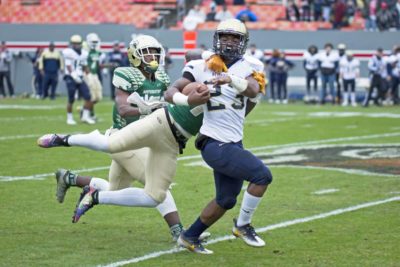A large slice of Americana is the high school football experience. Its popularly known as “Friday Night Lights,” a quaint and fitting title used for Buzz Bissinger’s best-selling book later turned into a movie starring Billy Bob Thornton.
The non-fiction story takes place in Texas, but the premise is based on Anytown, USA.
When the school year opens in the fall, Friday nights can create a bond between a community and a high school. School spirit can even be fostered and continued beyond football season.
But what if there is no on-campus football field?
R.J. Reynolds High in Winston-Salem is one of those schools.
Reynolds’ teams have been sharing Deaton-Thompson Stadium, an off-campus facility, with Parkland High.
Reynolds is separated from its home field by 5.7 miles and at least 12 stoplights along an estimated 16-minute drive. The annoyance of the drive is depicted in a video on a website promoting building a new stadium on campus.
“It’s difficult to get kids to our facilities, so we lose a lot of fans and athletes that way,” said Reynolds Athletic Director Brad Fisher. “I hear kids say they want to go to the game or play on the team, but they can’t get there. Some of them have parents that don’t want them spending that much of their day traveling to school and to practices.”
He continued: “It’s hard to hear that from kids. We want to be able to give every kid that wants to play for our school a chance to play without being on the road so much.”
But since Oct. 9, R.J. Reynolds High has been increasingly encouraged about the future.
That was the date plans to build an on-campus stadium were approved by the Winston-Salem/Forsyth County Schools’ board.
“We have the land on campus,” Fisher said. “It’s going to be a tight fit, but it’s going to fit in with the school aesthetically. It will look like it has been there 90 years like it was always meant to be.”
School alumni and parent volunteer groups have so far raised $1.1 million toward a projected estimated cost between $4.5 million and $7 million, depending on the length of the fundraising and construction. The Reynolds website includes a button to click on for donations.
Reynolds is one of the oldest high schools in North Carolina, having opened in 1923. It was built on land donated by Katherine Smith-Reynolds following the death of her husband, tobacco magnate R.J. Reynolds.
For many years, Hanes Park, a city-owned facility, across the street from Reynolds’ campus, was sufficient for practices and games. Only football was an orphan in an earlier era when high school sports were basically limited to meat-and-potato sports, football, basketball, and baseball.
But times have changed in the 21st century.
In addition to other traditional high school sports such as wrestling, track and field, and tennis, boys sports offerings now include the growing popularity of soccer and lacrosse.
And now double that total with the rapid growth of girls sports following Title IX legislation in the 1970s.
But aside from the athletes, the nature of a student body also has changed in the past 30 to 50 years. Desegregation was the first step toward balancing diversity. Another has been to move school boundaries to limit overcrowding. Magnet schools have been an additional element to attracting diversity and balancing enrollments.
With Reynolds located in an older community that has fewer students in the neighborhood than its past, Fisher said more than 60 percent of Reynolds enrollment resides outside the neighborhood.
To rebuild a school culture in changing times, Reynolds can look to Raleigh for an example. Athens Drive opened in 1978 without an on-campus football stadium, but through a long process of approval and fundraising, Jaguar Stadium opened three years ago.
“Our campus stadium has been a big boost to the culture of our school,” said Travis Seese, Athens Drive’s athletic director. “The kids are so much more excited about staying to watch the football team or soccer and lacrosse games. Our ticket sales have almost doubled the last three years.”
That also translates into increased funds for the athletic program from concession sales.
The Reynolds process to add an on-campus stadium began with an environmental impact study and architectural drawings. The step was completed in 2012 with approval from the Winston-Salem/Forsyth County district, but it was only the beginning.
The process also had to overcome objections from opposition groups. Neighborhood residents have objected to traffic and noise as a result of night games.
“It’s been hard to raise money before a shovel in the ground has turned any dirt,” Fisher said. “But it will help us now that we have approval from the school board. It’s been a lot to ask of parent volunteers to get the studies and the drawings done, but they did it. We’re doing this for the kids. It’s been something we’ve needed for a long time.”
Recommended reading



